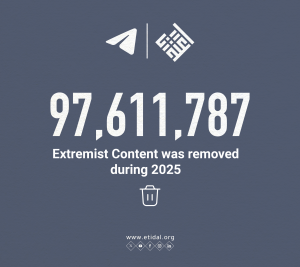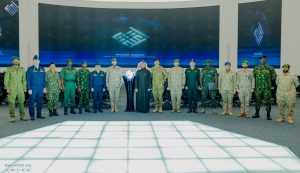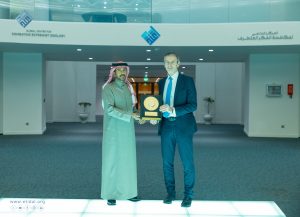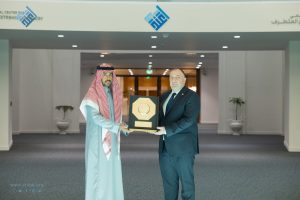He said Saudi Arabia is working sincerely to expose the ugly ideology used to justify the 11/9 terror attacks
The perpetrators of the Sept. 11, 2001, terror attacks harmed Muslims worldwide through the perversion of their faith, Dr. Mansour Al-Shammari, secretary-general of the Global Center for Combating Extremist Ideology (Etidal), said.
In an exclusive interview with Arab News in Riyadh to mark the 20th anniversary of the attacks, Al-Shammari said that Saudi Arabia has acted decisively to combat and eradicate the ideology that inspired the deadly strikes.
“The many measures that resulted from the terrorist attacks on New York City and Washington, D.C. were an attempt to confront Al-Qaeda’s nihilism, horrific violence and distortion of religious texts,” Al-Shammari said.
Etidal, which translates as “moderation” in Arabic, was inaugurated by King Salman in May 2017, alongside then US President Donald Trump and other leaders who attended the Arab Islamic American Summit in Riyadh.
The organization aims to help people and governments to confront the common enemies of humanity, fight extremist ideology, spread tolerance and moderation, and promote opportunities for world peace.
“The significance of this year’s commemoration of the Sept. 11 attacks lies in the recognition of the futility of violence rooted in nihilism, and the fact that the courage required to stop it is greater and more noble than what is required to practice it. Curbing the misinterpretation of religious teachings and understanding religious texts in their proper context marks the beginning of true awareness,” Al-Shammari said.

Q. The 20th anniversary of the Sept. 11 attacks comes amid a new crisis in Afghanistan. How do you view the coincidence?
A.The events of Sept. 11 constituted a painful attack on the civilizational values of nearly 2 billion Muslims, as terrorists latched on to their sacred religious texts and used them opportunistically to justify a heinous crime that claimed the lives of thousands of innocent people, including Muslims.
The present age has witnessed other cases of extreme violence besides the 9/11 attacks. Terrorists usually do not have a strategy for victory because they do not fight to protect life. On the contrary, they fight against the protection of life, both among themselves and with others. That is why the perpetrators of terrorist attacks fade into irrelevance over time, having wasted their lives through acts of pointless violence.
Terrorist violence is thus different from the measured violence of wars, through which regular armies seek to claim tangible victories on the battlefield, usually based on a rational calculation of gains and losses.
The violent misinterpretation of their religious texts by the terrorists created a distorted, negative image of Muslims that entered the public imagination, and thus amounted to a vicious attack on their faith.
The measures taken after the terrorist attacks are an attempt to confront two new phenomena: Nihilistic violence and perversion of faith. Afghanistan has become a victim of both the phenomena. The country has turned into a testbed for a hellish war machine that cannot end without a conclusive victory of one side. Radical armed groups have transformed Afghanistan into a field for a lost battle where everyone fights everyone.
We can say that the importance of this year’s commemoration of the Sept. 11 attacks lies in recognizing the futility of nihilistic violence. The courage required to stop it is greater and more noble than what is required to practice it. In addition, defining religious texts and interpreting them in their proper, contemporary context marks the beginning of achieving a measure of political maturity.
If we succeed in wiping out mindless nihilism and debunking deviant ideas, maybe then we can leave the painful legacy of the Sept. 11 disaster behind us.
Q. Did Al-Qaeda’s attacks on the World Trade Center towers in New York City have a symbolic meaning?
A.First of all, it should be noted that the catastrophic events of Sept. 11 did not come from nowhere, as tensions had remained throughout the world since the end of the Second World War. We know that the war in Afghanistan was part of this general state of tension. Just as religious ideology was used to mobilize fighters, Marxist ideology played the same role simultaneously in many East Asian and Latin American countries.
However, after the fall of the Soviet Union, the world order shifted toward unipolarity in terms of international relations. It did so within the framework of a globalized economic system, which sought to impose a coherent and unified development model across the world, giving absolute priority to multinational companies.
This shifted the focus of the terrorists to economic targets, which explains why Al-Qaeda chose the two World Trade Center towers for attack.
Suicide operations began to aim to disrupt the trade and tourism sectors by creating a sense of insecurity. This transformation coincided with a revolution in the media industry in the form of satellite television channels that provided, intentionally or unintentionally, free propaganda for Al-Qaeda’s terrorists, turning them into international figures at the least possible cost.

Q. How do you view terrorism today, 20 years after Sept. 11?
A.There has been a shift from terrorism on the ground to “networked terrorism.” This shift mirrors the history of the transformations of organizations over the past 20 years.
We are specifically aware of how difficult it is to track these changes, which is why we at Etidal are working on updating our strategy on the basis of the distinctions between these transformations. We consider them to be more than just formal distinctions.
This is why we have enormous interest in the different manifestations of digital terrorism and continuously seek to forge international partnerships. We are aware that the digital transition constitutes an end to localized terrorism and extremism because social media networks have erased all physical borders between terrorist and extremist organizations and their sympathizers.






